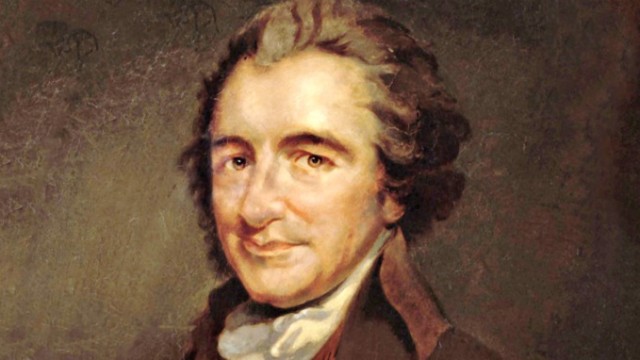Thomas Paine (1737-1809) is perhaps best described as the consummate classical liberal. The English-American writer and activist had an enormous influence on the fledging United States of America, with his thought being part of the inspiration for both the War of Independence and the new Constitution. He was the author of much political theory and wider philosophical works. Three of his texts, Common Sense, The Rights of Man, and The Age of Reason, were some of the most controversial of their day, in addition to being highly influential at the time and after. In addition to Paine’s contribution to political theory, he also played a key practical role as an activist and revolutionary. He participated in both the American and French Revolutions.
Paine’s thought falls into the varied tradition of classical liberalism. Broadly speaking, he advocated individual rights, political and legal equality, free markets, civic republicanism, democracy, freethinking, rationalism, cosmopolitanism, and a strong concern for those worst off in society. He opposed hereditary privilege, arbitrary government, monarchy, despotism, unaccountable power, capital punishment, institutionalised religion, and corruption.
Paine also stood for principles at odds with those of his allies. Despite his republicanism, he was opposed to the execution of Louis XVI following the French Revolution due to his strong moral aversion to capital punishment and revenge killings. Unlike many of the Founding Fathers of the US, Paine was an early opponent of slavery. He was unafraid of criticising (and making enemies of) popular and influential figures of the time, including George Washington, Napoleon, Edmund Burke, and Maximillien Robespierre. His theories of property and justice combined a classical liberal respect for private ownership with a modern liberal concern for the welfare of the poor. As such, he was an advocate of a guaranteed minimum income (and supported taxing land rather than income).
Paine’s principled humanism and his eloquent arguments for freedom, equality, and democracy have ensured his continuing influence. John Adams, Thomas Edison, Abraham Lincoln, Bertrand Russell, and Christopher Hitchens have all claimed influence from Paine. Similarly, modern liberals, libertarians (right and left), anarchists (individualist and collectivist), feminists, cosmopolitans, and democratic socialists, can all trace aspects of their thought back to Paine’s work.
1) Some writers have so confounded society with government, as to leave little or no distinction between them; whereas they are not only different, but have different origins. Society is produced by our wants, and government by our wickedness; the former promotes our happiness positively by uniting our affections, the latter negatively by restraining our vices. The one encourages intercourse, the other creates distinctions. The first a patron, the last a punisher.
Common Sense (1776)
2) Society in every state is a blessing, but government even in its best state is but a necessary evil; in its worst state an intolerable one; for when we suffer, or are exposed to the same miseries by a government, which we might expect in a country without government, our calamity is heightened by reflecting that we furnish the means by which we suffer.
Common Sense (1776)
3) Men who look upon themselves born to reign, and others to obey, soon grow insolent; selected from the rest of mankind their minds are early poisoned by importance; and the world they act in differs so materially from the world at large, that they have but little opportunity of knowing its true interest, and when they succeed to the government are frequently the most ignorant and unfit of any throughout the dominions.
Common Sense (1776)
4) It is pleasant to observe by what regular gradation we surmount the force of local prejudice as we enlarge our acquaintance with the world.
Common Sense (1776)
5) Mingling religion with politics may be disavowed and reprobated by every inhabitant of America.
Common Sense (1776)
6) He who is the author of a war, lets loose the whole contagion of hell, and opens a vein that bleeds a nation to death.
The American Crisis No. V (1778)
7) Man is not the enemy of man but through the medium of a false system of government.
The Rights of Man (1791)
8) You will do me the justice to remember, that I have always strenuously supported the Right of every Man to his own opinion, however different that opinion might be to mine. He who denies to another this right, makes a slave of himself to his present opinion, because he precludes himself the right of changing it.
The Age of Reason, Part 1 (1793)
9) An avidity to punish is always dangerous to liberty. It leads men to stretch, to misinterpret, and to misapply even the best of laws. He that would make his own liberty secure must guard even his enemy from oppression; for if he violates this duty he establishes a precedent that will reach to himself.
First Principles of Government (1795)
10) I care not how affluent some may be, provided that none be miserable in consequence of it.
Agrarian Justice (1975-1796)

